Veterans Day is a time to honor those who have served in the U.S. armed forces.
Here, UW Medicine nurses who are veterans reflect on their time in the military, lessons they learned and what they want others to know about veterans and Veterans Day.
Isaac Hurley, RN, Flight Nurse, Airlift Northwest
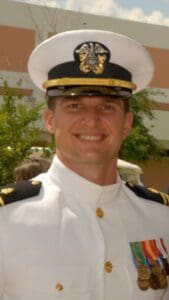
What was your role in the military?
I was a combat trauma nurse. I served with Operation Iraqi Freedom and Enduring Freedom. I went once to Operation Iraqi Freedom and twice with Operation Enduring Freedom. What I count as being the pinnacle of my military career was serving in Afghanistan as a combat trauma receiving nurse. I worked at Camp Bastion, which was in the Helmand Province in the southern part of Afghanistan. It was a hotly contested area in which Taliban and insurgent fighters fought hard over because it contained a large section of poppy fields, and poppy was a primary means of fueling extremist activities. It was considered the busiest trauma facility in the world during its time.
What lessons did you bring into your nursing practice?
Being in the military changes you, it changes the way you think about things and interact with people for better and for worse. You are among people with common goals, common ideas and more importantly common purpose. When you live a life with a purpose and a direction it changes all of your other priorities. It becomes the only thing you focus on. I really struggled when getting out of the military to find a similar purpose. Finally, after being hired with Airlift Northwest, I found myself surrounded by professionals with similar goals and conviction. Airlift Northwest gave me back a similar purpose I’d experienced in the military. I’d been missing that; I didn’t have it with other jobs until I got here. Airlift Northwest has an expectation for excellence, and they expect nothing but your best. We all share the same goals and desires to help other people who are in the worst possible way, in the farthest out locations and get them to safety.
What do you want people to know about veterans and Veterans Day?
Most of the veterans I’ve ever served with, and me included, we’re not here for recognition. None of us really want praise or pomp and circumstance, we just want the country to know we serve with no expectation of return.
Lastly, when service men and women make the transition to civilian life, many feel lost and without the structure and purpose the military provided. When you lose your purpose or direction, it can destroy you. And it has destroyed many veterans. We’ve seen many veterans commit suicide over the years, and it’s hard to see those who’ve given so much die before their story is finished. For veterans who are reading this, know you aren’t alone. There are options, there is help out there for you.
Jennifer Schofield, RN, Neuro ICU and COVID-19 ICU, Harborview Medical Center
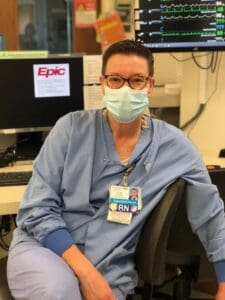
What was your role in the military?
I went into active army in 1989 as military police. After I was discharged from active duty, about a year later, I enlisted in the Army National Guard in Washington, but they didn’t allow women to be military police, so I went in as personnel. It didn’t suit me, so I went into the Airforce Guard and did combat communications.
What lessons did you bring into your nursing practice?
If I had to really pick something, a sense of perseverance. As you can imagine, at Harborview in the ICU we deal with a lot of adversity and very mentally, physically and emotionally trying experiences and situations. As a nurse shepherding patients and families through obviously difficult situations, it’s kind of just one foot in front of the other, keep trudging and keep going.
What do you want people to know about veterans and Veterans Day?
My partner — she’s a veteran also, a retired Coast Guard — we talk about this a bit, it sounds a little curmudgeonly, but the holiday isn’t just about a barbeque, you know? There’s a reason why it’s a holiday and I just want people to reflect on that.
Jerrome Sicat, RN, Triage Nurse, UW Neighborhood Northgate Clinic
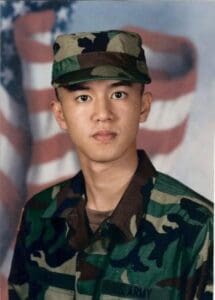
What was your role in the military?
I went to the military right after high school. I joined as a combat medic when I went into the Army in 2004. As a medic I was always training soldiers and other branches of the military on first aid training in the battlefield prior to deploying in war zones. I also worked in clinic and inpatient settings serving soldiers and their families in their medical care.
What lessons did you bring into your nursing practice?
Specific skills translated well into my nursing career like assessing, teaching and adapting. For me the biggest thing is just being practical when it comes to teaching patients, trying to find common ground with them so they can understand at a deeper level and retain that information. The military is such a mixture of different people, ranks, ethnicities and views in life. It’s a great place to learn about people. Having to treat soldiers and family members coming from different walks of life provided a great template on how I practice my nursing career.
What do you want people to know about veterans and Veterans Day?
We’re a very select few as only 1% of the total U.S. population goes into the military. I salute every veteran out there for the sacrifices they have made. I just wish we had better support for veterans. Here in Seattle, the homeless population and COVID-19 has made it even harder for veterans to find the help they need. I would like to bring awareness on Veterans Day for the veterans who really need help with homelessness, mental and physical health, transitioning into civilian life and other issues.
Elizabeth Bridges, PhD, RN, CCNS, FCCM, FAAN, Clinical Nurse Researcher, UW Medical Center – Montlake, and Professor in the UW School of Nursing
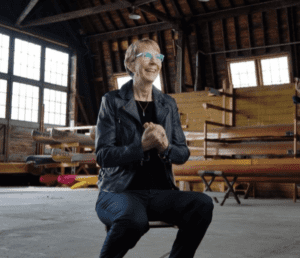
What was your role in the military?
I was in the Airforce and worked as a critical care nurse and in research. I study the integration of hemodynamics and monitoring into the care of critically ill patients on the battlefield and during long distance transport. I have 30-plus years of military service. Along the way I have always stayed clinical as a researcher, which is not traditional as you move up in ranks in the military.
What lessons did you bring into your nursing practice?
I think a lesson I learned from the military, which profoundly changed my life when I came back from Afghanistan, was seeing an organization that’s all in. It’s that palpable sense of everyone in the military being committed to bringing wounded warriors safely home. What I’ve said at UW Medical Center for years is I feel that same commitment here.
When the pandemic hit, it felt like I was deployed again. One of the extra things I do is serve on the board of directors AACN [American Association of Critical-Care Nurses], the largest not-for-profit nursing organization in the world. I had the privilege of serving as the President for the past year. Last year, our national theme that I helped develop was, ‘This is our moment, all in.’ It’s what I saw at UW and it inspired me, but I was also thinking about lessons I learned from the military.
What do you want people to know about veterans and Veterans Day?
I’d say right now, in this year with the pandemic, it’s that we’ve been there. This is, for the military, the mission you sign up for: to go wherever you’re needed. So, there are a lot of experiences from the military that we can share. The lessons we’re learning now are lessons that military veterans have had for years. The other lesson is to always look after your wingman – your partners. I am so proud to see that commitment to each other, whether it’s in the military or now. The last 18 months have given people a flavor of that. The best decision I ever made in my life was to raise my right hand and go into the military. Without a doubt. I’m proud to be able to share those lessons and learn from colleagues at UW.
Elizabeth Tassani, RN, Staff Nurse in the Emergency Department, UW Medical Center – Northwest
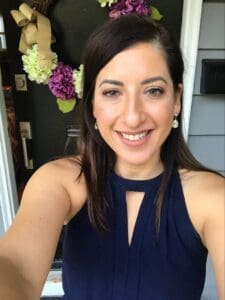
What was your role in the military?
I was in the U.S. Navy, as enlisted and an officer. I started out as an airman stationed in a P-3C Squadron in Hawaii. I only planned to be in the Navy for four years, so I wanted to have a job that most people would not get the opportunity to have. I successfully tested into the job of avionics electronics technician by studying a manual and on-the-job training. I worked on avionics systems on the airplane such as high frequency (HF) radios, navigation aids, infrared system and the sono buoy tracking system on the plane. I worked at Barber’s Point on Oahu, Hawaii, and deployed to Diego Garcia, British Indian Ocean Territory, and Misawa, Japan.
After college, I owed the Navy four years of service as a nurse at the National Naval Medical Center in Bethesda, Maryland. I began my nursing career an O-1E (Ensign) on a medical floor taking care of retired veterans, foreign diplomats and marines returning from Iraq and Afghanistan with traumatic brain injuries and improvised explosive device blast injuries. In the Navy, I was able to float to other units and the ED piqued my interest as I enjoyed the flow and the care I was able to give.
What lessons did you bring into your nursing practice?
There are many lessons that I have brought into my practice at UW Medicine. One is embracing all different types of people from all different backgrounds and culture beliefs. While traveling and visiting different countries, I was able to learn and embrace many different cultures.
What do you want people to know about veterans and Veterans Day?
I would want people to know that veterans give up a lot to serve their country, but it is definitely rewarding.
Mo VanDerPuy, RN, Flight Nurse, Airlift Northwest
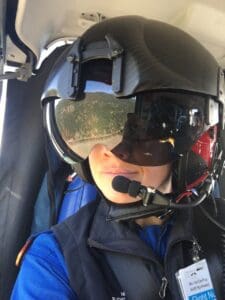
What was your role in the military?
I was an army nurse for five years.
What lessons did you bring into your nursing practice?
When I served in Iraq, I was a nurse taking care of Iraqi detainees. It wasn’t a popular opinion, but I thought what we were doing was really important because I believe every human deserves dignity and respect. There weren’t many of my colleagues while I was over there that held that opinion, because these are the quote-unquote “enemies,” but I thought, ‘These are human beings and they deserve dignity.’ I carry that over to my nursing. It does not matter who the human is, they deserve dignity and respect and healthcare. That’s something I try to hold on to.
What do you want people to know about veterans and Veterans Day?
There’s never going to be a way to completely understand what it’s like to have served, especially for those who had to go to war. Just offer a lot of grace to people, because they weren’t there necessarily because they wanted to be in that certain situation. Whatever situation they were put in, they didn’t have a lot of call in that. I think a lot of people might blame people that served, but the things they had to do, nobody should have to ask someone to do those things. I didn’t have to because I was a nurse, but it comes down to providing a lot of grace to people.
Sean Burden, RN, Emergency Room Nurse, UW Medical Center – Northwest
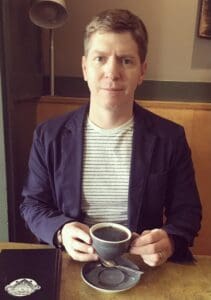
What was your role in the military?
I was a Navy Corpsman, which is a Navy medic. I enlisted in 1999, then 9/11 was in 2001. In early 2003 I was deployed to Iraq. I was a part of the first unit stationed in Kuwait waiting to see what would happen. The unit I was attached to was like “MASH,” only aside from surgical tents there was an emergency room tent. That gave me my first real taste of working in an emergency room, and it influenced where I wanted to go when I got back, once I was a civilian.
What lessons did you bring into your nursing practice?
There’s a certain discipline and formality I’ve brought with me that I really like and cherish and am glad it was something instilled in me at that time. I’m never late for work; I’m always there ready to clock in. I call all doctors sir or ma’am as a reflex. There is a certain level of discipline that I think works really well with nursing and medicine, and I’m really proud of that.
What do you want people to know about veterans and Veterans Day?
I like Veterans Day. I tell my wife it’s my favorite holiday. It gives me a moment to reflect on everything I did while I was there and things I value and have carried forward. I hope and want employees in general to take a moment on Veterans Day to think about the people that have served and done that work.


Raves & Raves: December 2024